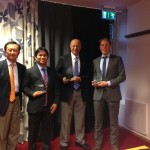The long-awaited list of winners of the prestigious Reed Elsevier Environmental Challenge has been announced September 3rd in Stockholm during World Water Week. Affordable and accessible projects, they provide blueprints for bringing safe water and sanitation to communities around the developing world.
This video news release features sequences and interviews with key figures at the Award Ceremony. It also includes frontline footage from the three prize-winning projects:
• We visit Cambodia to see the groundbreaking project of WaterSHED Asia : The first prize of $50,000 will go to their affordable,sustainable and culturally acceptable solution for access to latrine shelters, in a country where 70% of villagers lack a toilet. Their approach could have wide impact for the millions of households lacking sanitation in villages throughout the world.
• Significant numbers of deaths and disease are linked to high levels of naturally occurring arsenic in untreated groundwater throughout South Asia. We go to West Bengal, India to see an innovative and sustainable technology for removing the arsenic – a project of Gadgil Lab, winners of the $25,000 second prize. The prize will be used specifically to deliver safe water to children in West Bengal, but their landmark technical solution could be applicable everywhere.
• Finally, we visit Jinja, Uganda, where Text to Change plan to harness popular smartphone technology to map water points and alert experts when repairs are needed. Their system, called WaterMonitor will be awarded a special $15,000 prize by WASH Alliance – a consortium of Dutch NGOs. It provides an innovative model for dealing with the widespread problem of leaking water points, making precious water more available to the people who need it.
The Reed Elsevier Environmental Challenge was launched in 2011 to contribute to the UN Water for Life Decade 2005-2015. An international panel of expert judges evaluate the competing projects. WHO data from 2011 showed 768m people are dependent on unsafe drinking water sources, and 2.5bn people lack access to improved sanitation facilities.
Reed Elsevier is a global provider of world-class information and tools that help their customers advance science, improve medical outcomes, enable better legal decisions, evaluate risk, forge business relationships and gain business insight. The company has a growing portfolio of products and services that advance environmental knowledge and understanding.
http://shar.es/i1oPy
